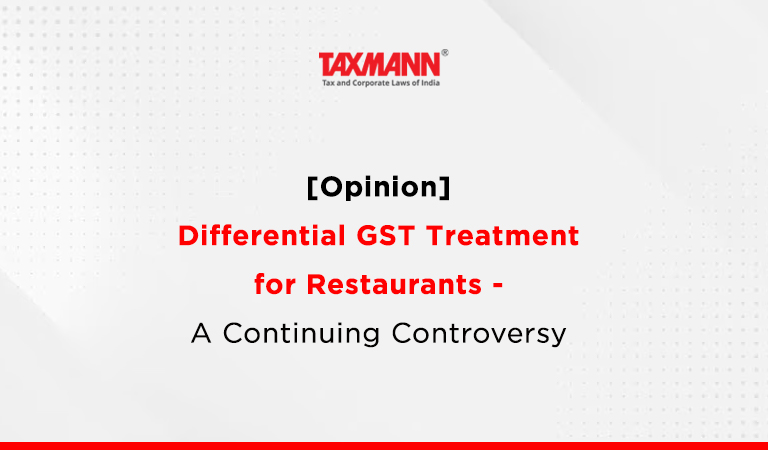[Opinion] Differential GST Treatment for Restaurants – A Continuing Controversy
- News|Blog|GST & Customs|
- 2 Min Read
- By Taxmann
- |
- Last Updated on 31 January, 2024

Hardik Shah & Kumar Parekh – [2023] 148 taxmann.com 235 (Article)
There has been a widespread change in the eating experience offered by restaurants, cafes and eating joints recently. The new age restaurants and cafes now have extensive offerings of cooked food, as well as ready-to-eat options, desserts and over-the-counter saleable food, along with ready-to-drink beverages. Also, the concept of cloud kitchen is in vogue due to benefits from structure optimization and cost-effectiveness. The food would be cooked at one place, i.e., in the cloud kitchen and the same would be offered/sold through restaurants or eating joints who would ultimately serve the same to consumers. This paradigm shift in business is to vow maximum consumers amid changing preferences and requirements.
However, when the above business modus-operandi is seen in the light of GST provisions, tax implications do not appear to be simple. The trade has unresolved doubts on the taxability of cooked food vis-à-vis ready-to-eat food and over-the-counter sale of food, desserts and beverages. Therefore, applications were filed before the Advance Ruling authorities seeking ruling on taxability and the applicable rates thereon on different food items, in view of multiple permutations and combination of transactions adopted by the restaurant and food industry.
One such recent advance ruling was issued by the Gujarat Advance Ruling Authority (Authority) wherein the Authority ruled as under:
1. The supply of ice cream from the outlets of the applicant cannot be considered as supply of ‘restaurant services’. The readily available ice creams [not prepared in their outlets] sold over the counter is supply of goods. However, an ice cream when ordered and supplied along with cooked or prepared food, through their outlets would assume the character of composite supply, wherein the prepared food being the principal supply and hence qualifies as ‘restaurant services’.
2. The supply of ice cream from the outlets of the applicant is not classified as ‘restaurant services’. However, the composite supply, supra, classifiable under ‘restaurant service’ would be leviable to GST @ 5% with no input tax credit as per Sr. No. 7(ii) of notification No. 11/2017-CT (Rate) dtd 28.6.2017 as amended vide notification No. 20/2019-CT (Rate) dated 30.9.2019.
3. The supply of only ice cream [not prepared in their outlets and which is readily available] from any of the outlets of applicants is held to be akin to supply of ice cream from ice cream parlour, leviable to GST @ 18%.
The above ruling makes an artificial distinction in tax treatment based on sale/service of the underlying product, i.e., readily available or cooked. It rules that readily available ice creams not prepared in their outlets, would not form part of restaurant services and would be considered as supply of goods, subject to 18% GST. However, when the same ice-cream is sold/served along with cooked or prepared food, then the same would form part of composite supply of restaurant services.
Click Here To Read The Full Article
Disclaimer: The content/information published on the website is only for general information of the user and shall not be construed as legal advice. While the Taxmann has exercised reasonable efforts to ensure the veracity of information/content published, Taxmann shall be under no liability in any manner whatsoever for incorrect information, if any.

Taxmann Publications has a dedicated in-house Research & Editorial Team. This team consists of a team of Chartered Accountants, Company Secretaries, and Lawyers. This team works under the guidance and supervision of editor-in-chief Mr Rakesh Bhargava.
The Research and Editorial Team is responsible for developing reliable and accurate content for the readers. The team follows the six-sigma approach to achieve the benchmark of zero error in its publications and research platforms. The team ensures that the following publication guidelines are thoroughly followed while developing the content:
- The statutory material is obtained only from the authorized and reliable sources
- All the latest developments in the judicial and legislative fields are covered
- Prepare the analytical write-ups on current, controversial, and important issues to help the readers to understand the concept and its implications
- Every content published by Taxmann is complete, accurate and lucid
- All evidence-based statements are supported with proper reference to Section, Circular No., Notification No. or citations
- The golden rules of grammar, style and consistency are thoroughly followed
- Font and size that’s easy to read and remain consistent across all imprint and digital publications are applied



 CA | CS | CMA
CA | CS | CMA
